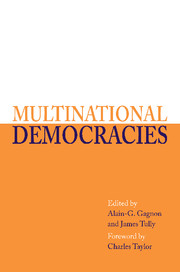Book contents
- Frontmatter
- Contents
- Notes on the contributors
- Foreword by Charles Taylor
- Acknowledgements
- Introduction
- Part I Justice and stability in multinational democracies
- Part II Struggles over recognition and institutions of accommodation
- Part III Modes of reconciliation and conflict management
- 11 Liberal citizenship in multinational societies
- 12 Nationality in divided societies
- 13 The moral foundations of asymmetrical federalism: a normative exploration of the case of Quebec and Canada
- 14 Federalism and the management of conflict in multinational societies
- References
- Index
12 - Nationality in divided societies
Published online by Cambridge University Press: 06 October 2009
- Frontmatter
- Contents
- Notes on the contributors
- Foreword by Charles Taylor
- Acknowledgements
- Introduction
- Part I Justice and stability in multinational democracies
- Part II Struggles over recognition and institutions of accommodation
- Part III Modes of reconciliation and conflict management
- 11 Liberal citizenship in multinational societies
- 12 Nationality in divided societies
- 13 The moral foundations of asymmetrical federalism: a normative exploration of the case of Quebec and Canada
- 14 Federalism and the management of conflict in multinational societies
- References
- Index
Summary
Introduction
When people like myself defend the principle of national self-determination – the principle that where a body of people form a national community, they should be allowed to control their own affairs through institutions of self-government – they run into a barrage of objections from liberals. One objection, very much in the spirit of Pope's famous couplet, ‘For forms of government let fools contest / Whate'er is best administer'd is best’, says that what matters is good government, not self-government. More specifically, what matters is that governments should respect the liberties and rights of their subjects and pursue enlightened policies generally; who does the governing, whether compatriot or foreigner, is of no intrinsic importance. A second objection points to the external costs of national self-determination. Political communities which are empowered through self-government to pursue the interests of their members will do so at the expense of outsiders. Their policies will be based on narrow notions of national interest, and are likely to harm the freedom and well-being of the vulnerable and destitute the world over. In place of national government we should have world government, or at least a strong international regime of some kind.
These are objections of principle to national self-determination, one stemming from classical liberalism, the other from a more modern cosmopolitan liberalism. They will not be my concern here. Instead I want to try to respond to a third kind of liberal objection, which runs along the following lines.
- Type
- Chapter
- Information
- Multinational Democracies , pp. 299 - 318Publisher: Cambridge University PressPrint publication year: 2001
- 17
- Cited by



